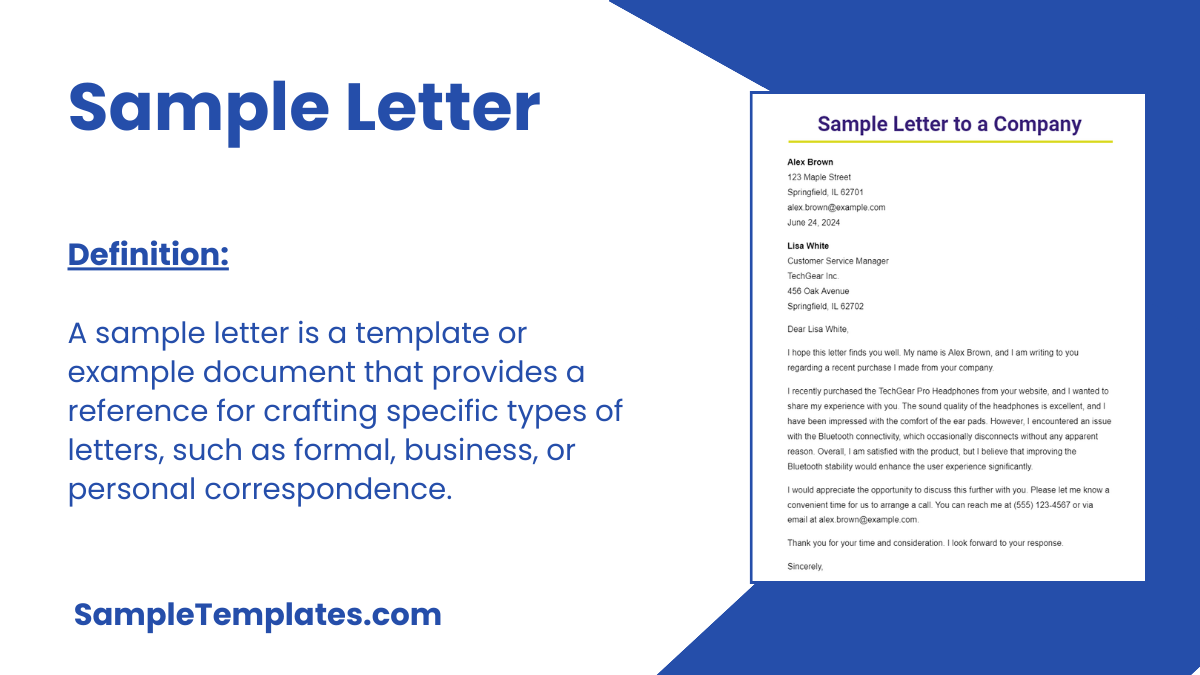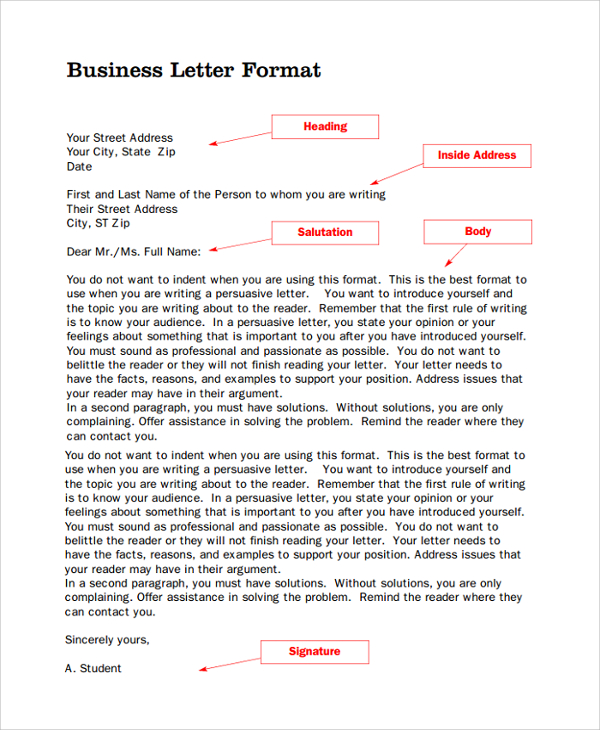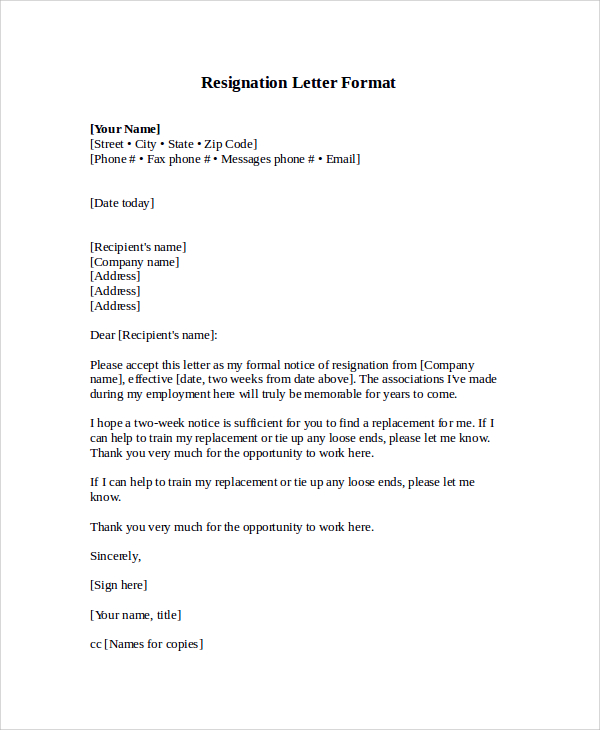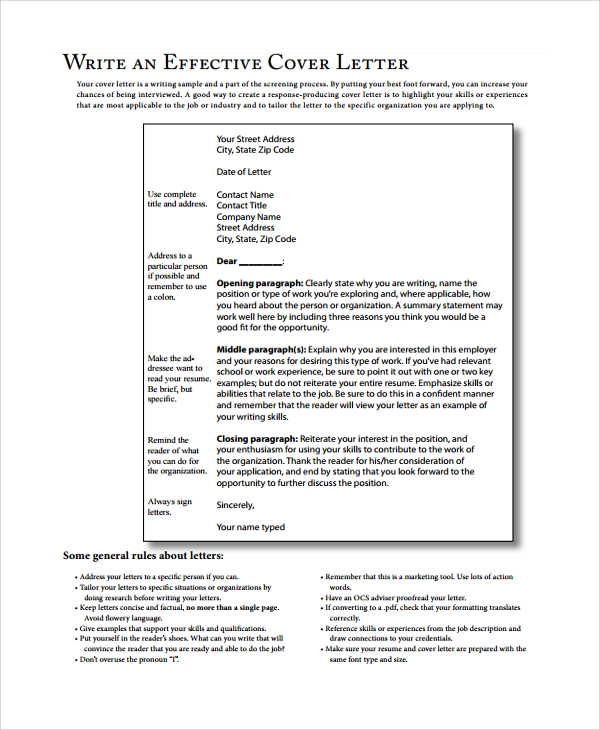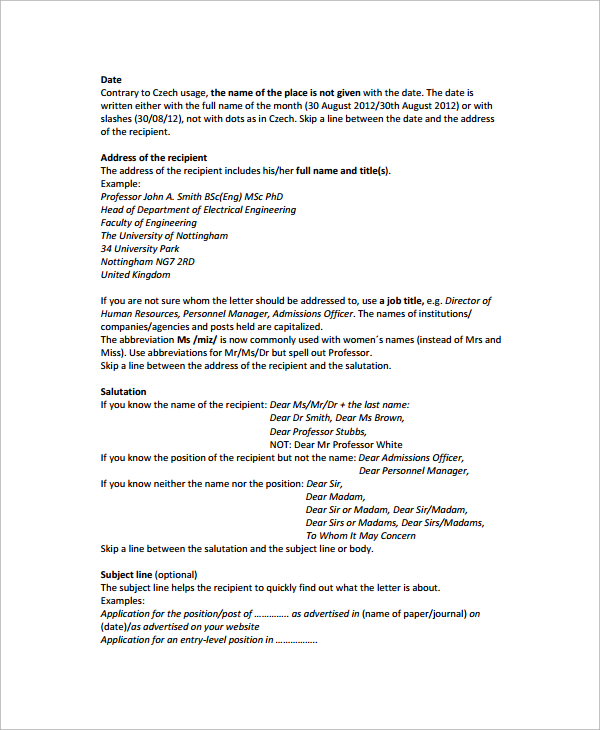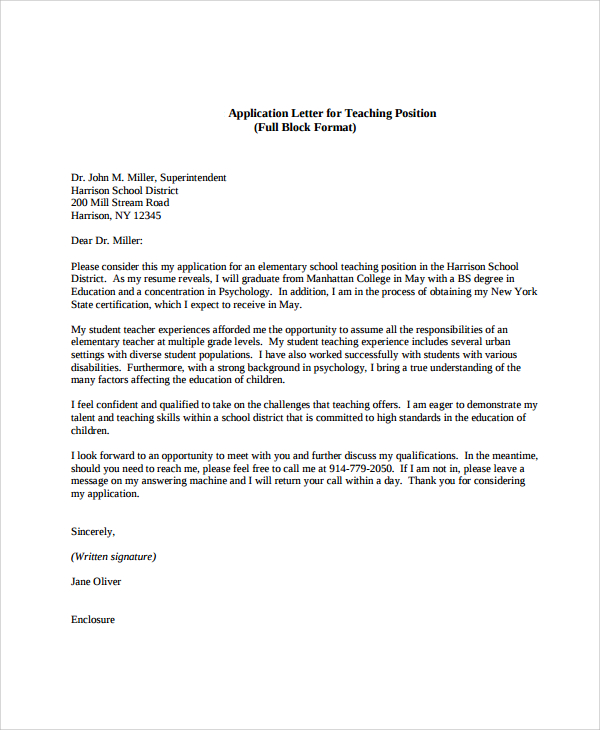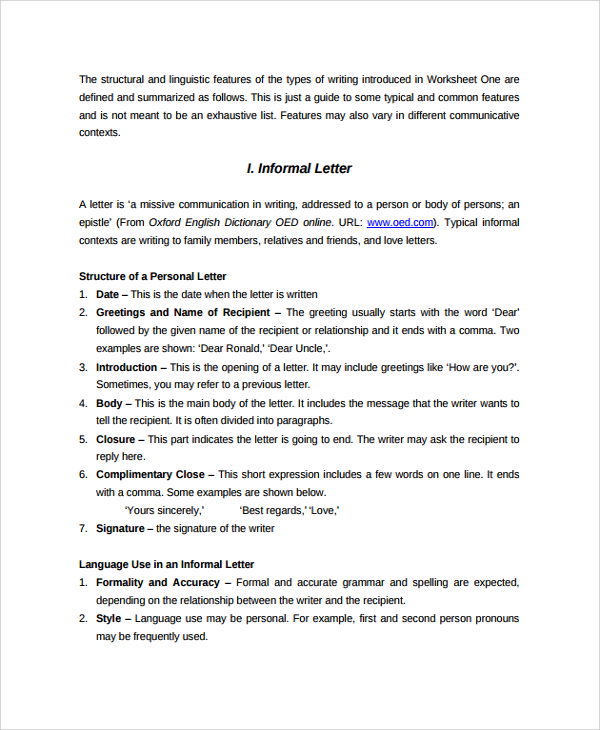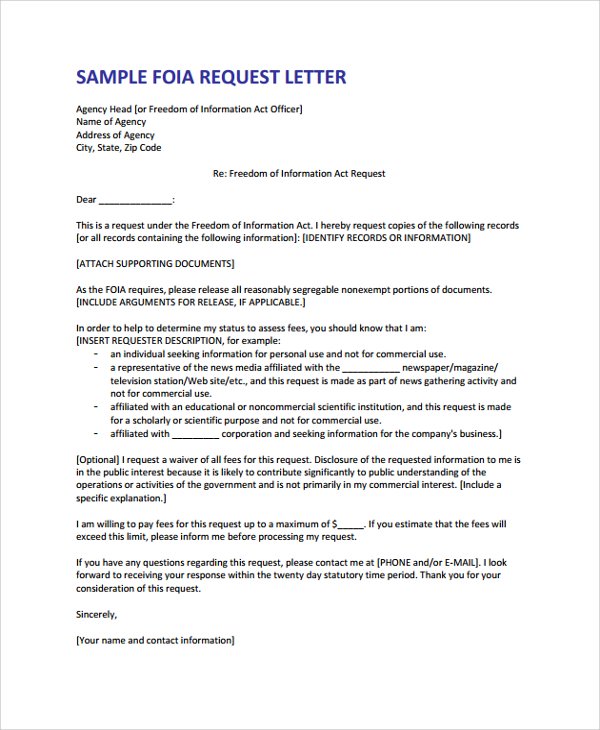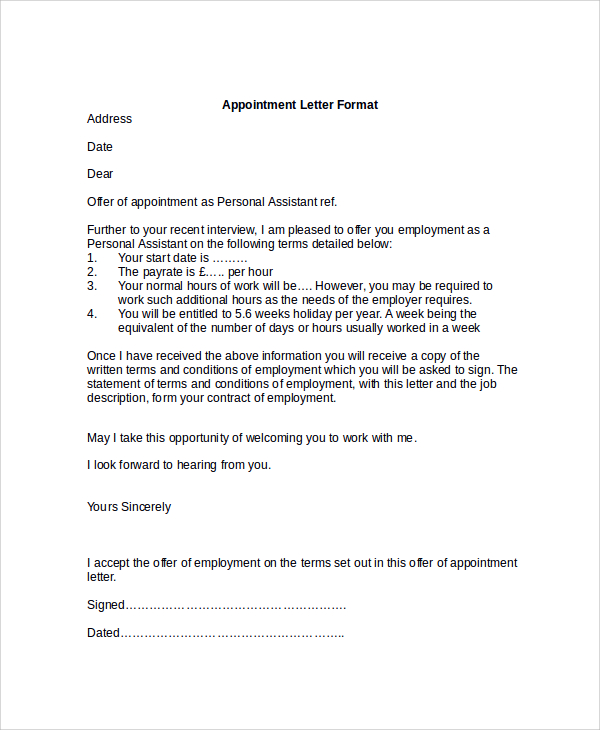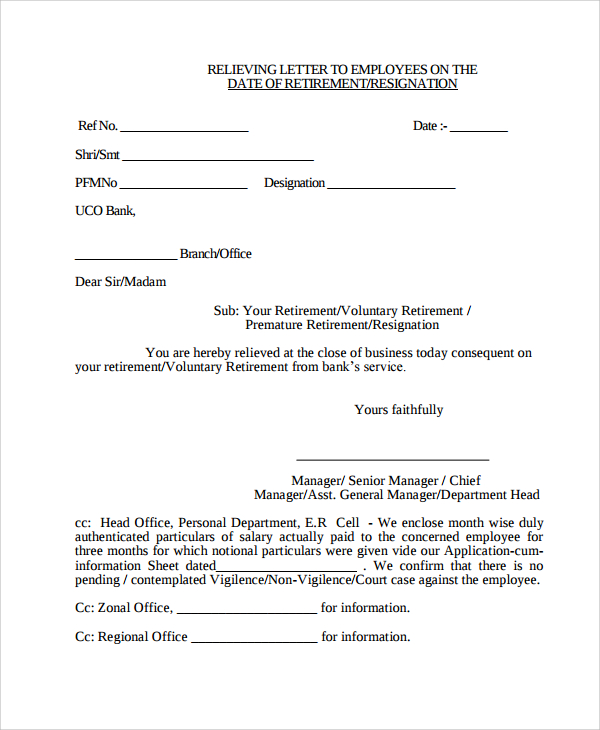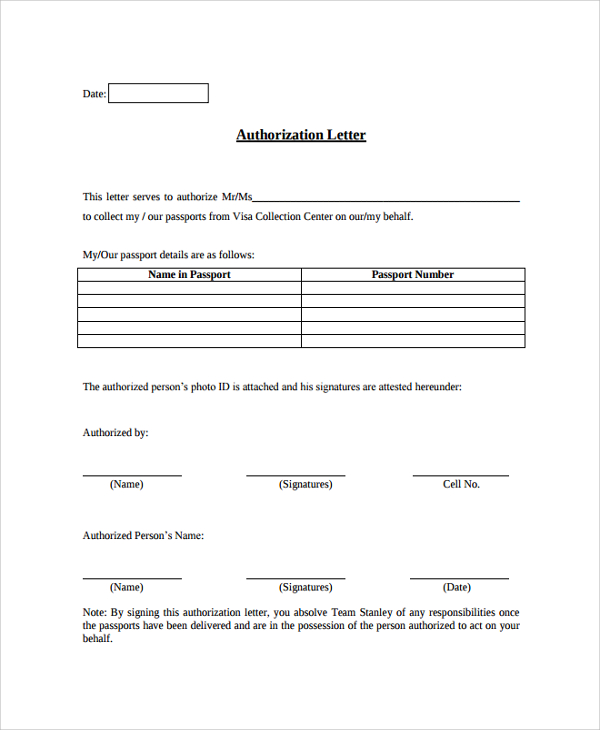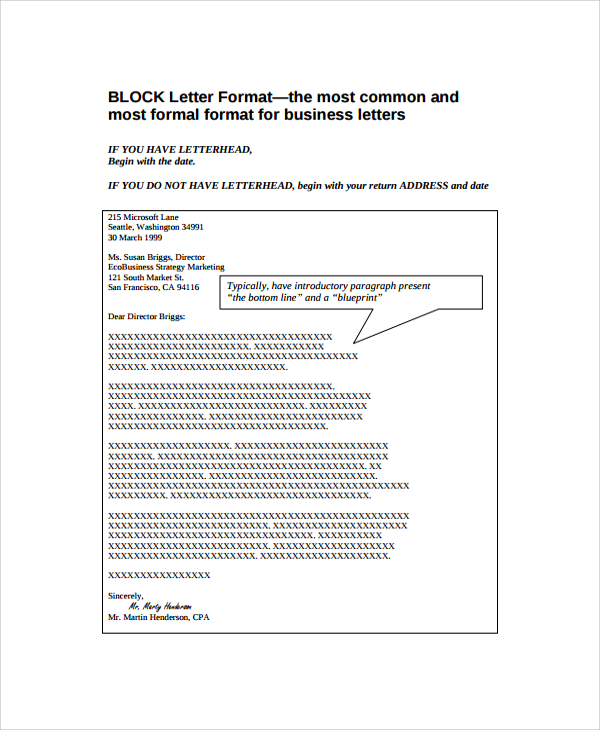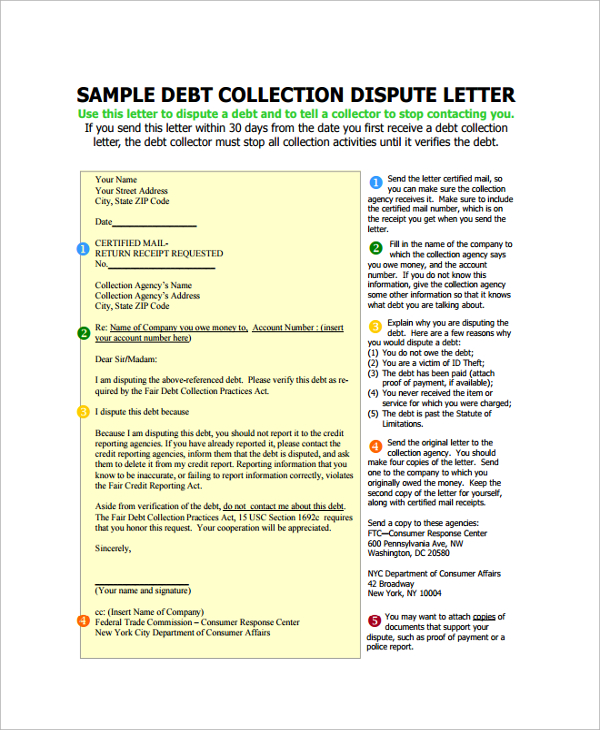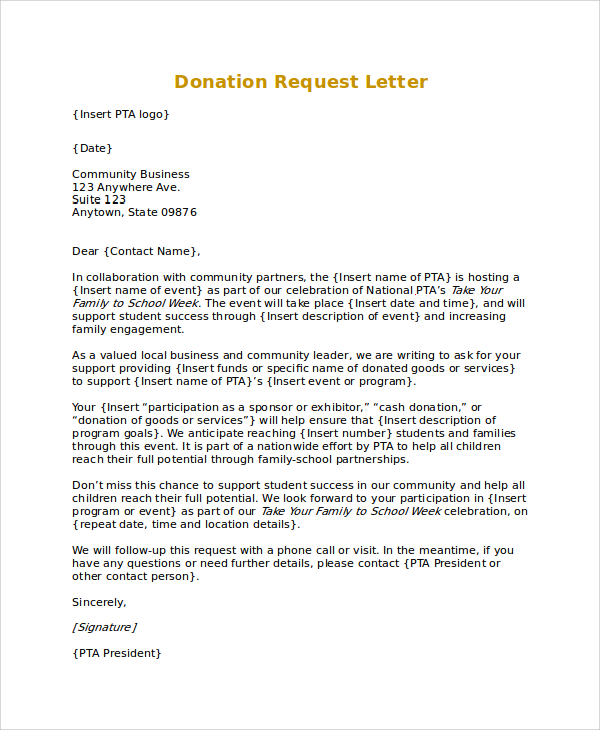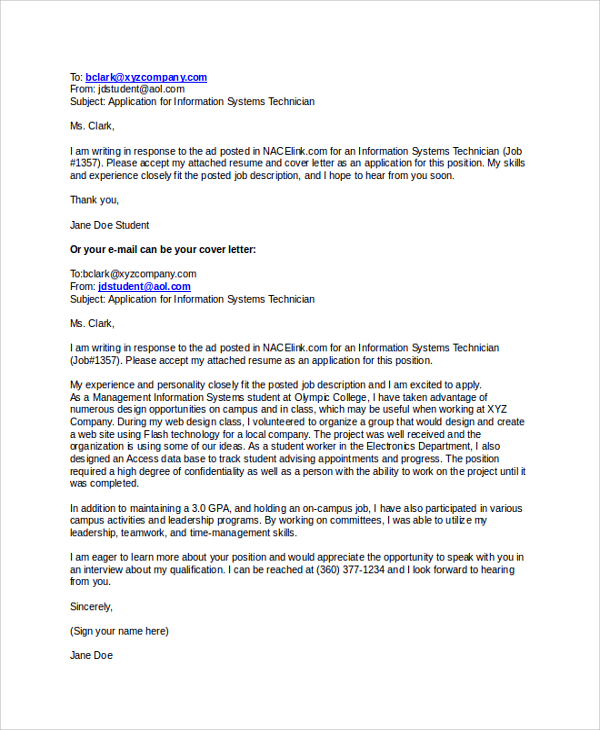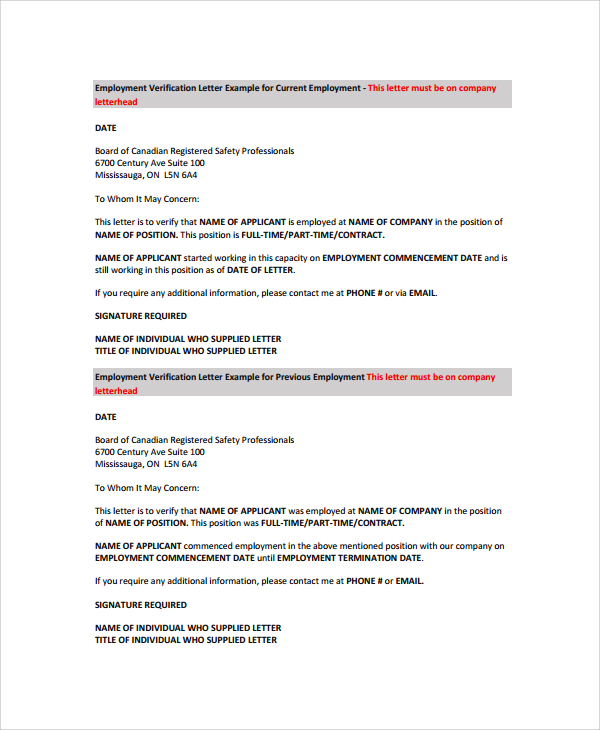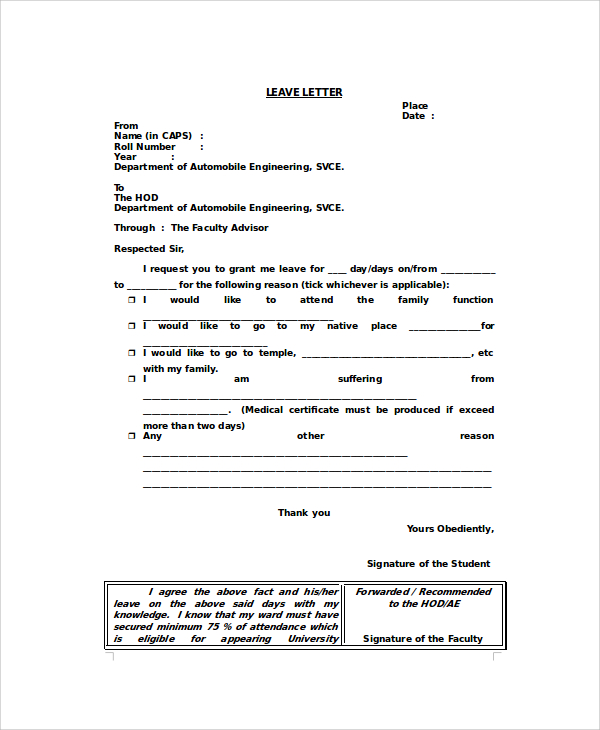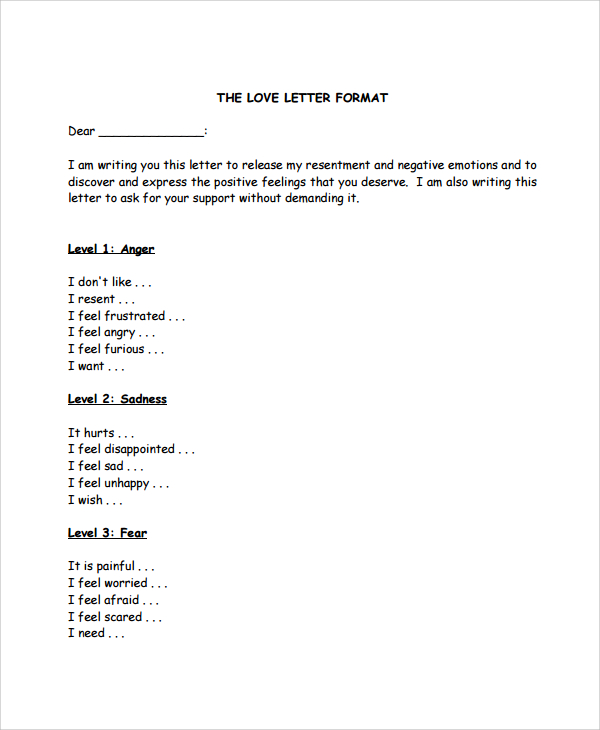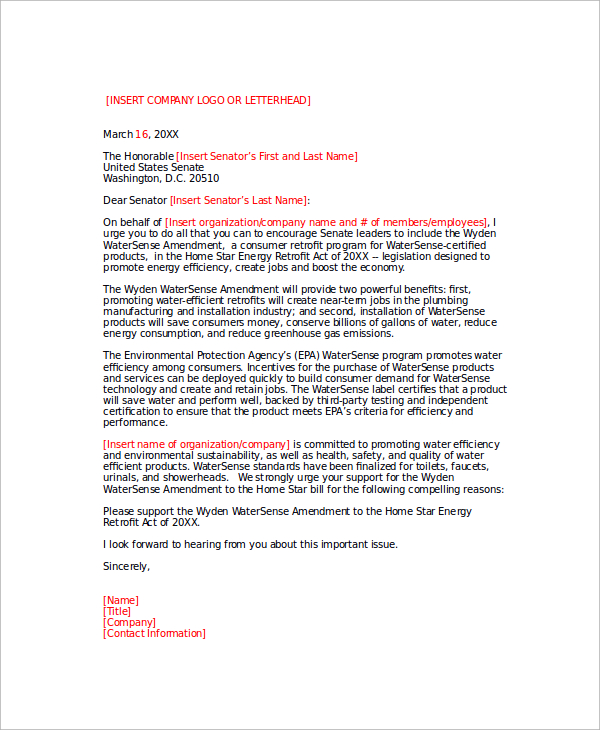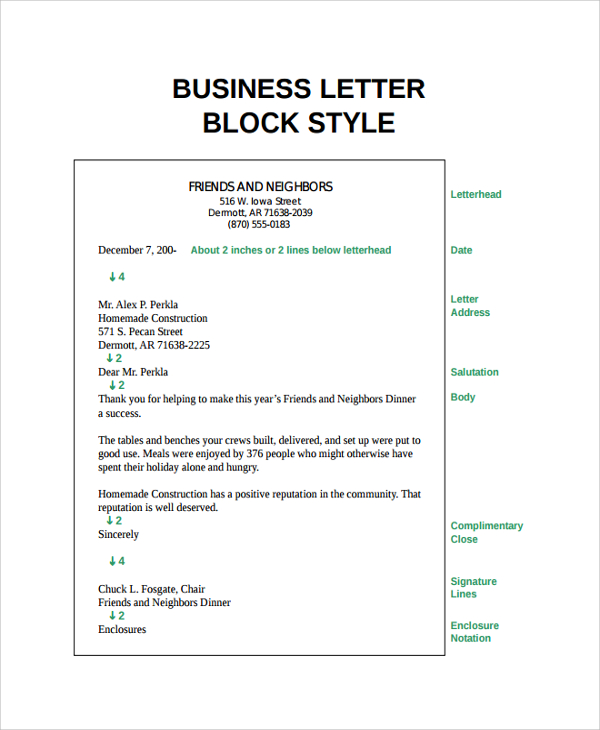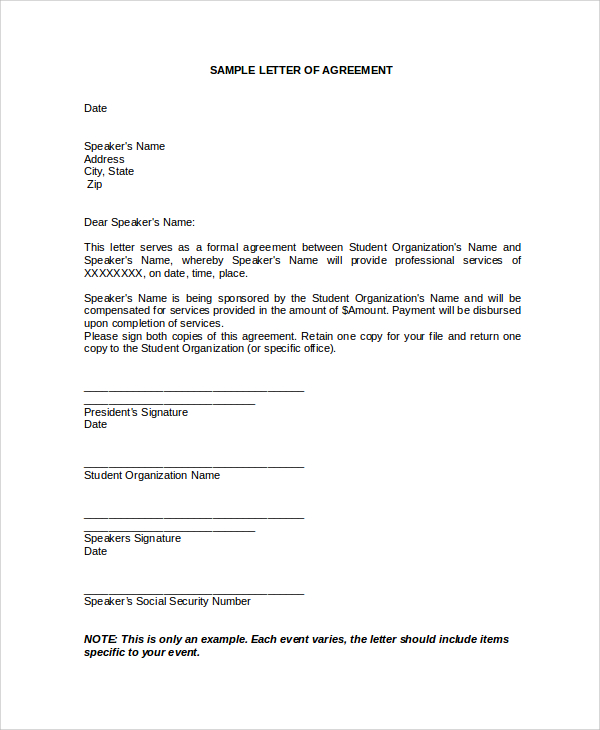There has to be a striking attention seeking style about your letter writing. Not every letter gets read. Not every letter gets prepared impressive enough. Not every letter has the right format and presentation of facts or request. Not every letter becomes an ideal application. Therefore there is a lot to know, understand and adapt when it comes to letter writing. That is why there are the Formal Letter Formats brought online for the layman. You may have little idea of letter writing for being in a job that demands not much writing out of you. But when you have to construct a letter either officially or informally or personally for a purpose you would like to refer to standard and perfect formats. Hence sample letter formats from internal link anchor text are a great source of help.
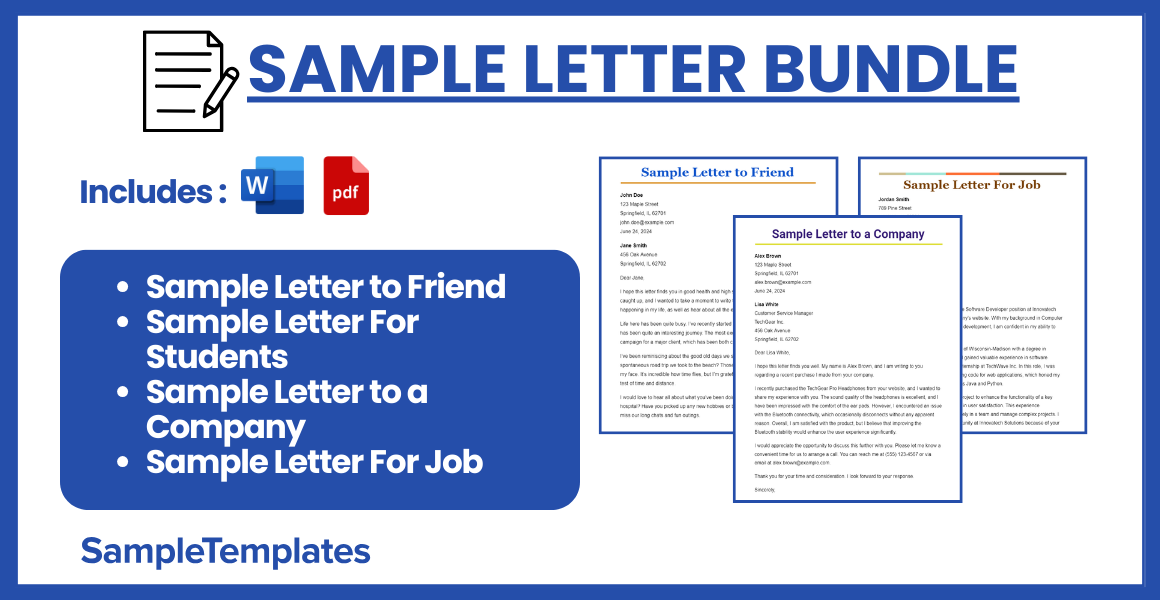
Sample Letter to Friend
John Doe
123 Maple Street
Springfield, IL 62701
[email protected]
June 24, 2024
Jane Smith
456 Oak Avenue
Springfield, IL 62702
Dear Jane,
I hope this letter finds you in good health and high spirits. It feels like ages since we last caught up, and I wanted to take a moment to write to you and share what’s been happening in my life, as well as hear about all the exciting things you’ve been up to.
Life here has been quite busy. I’ve recently started a new job at a marketing firm, and it has been quite an interesting journey. The most exciting part has been working on a big campaign for a major client, which has been both challenging and rewarding.
I’ve been reminiscing about the good old days we spent together. Remember that spontaneous road trip we took to the beach? Those moments always bring a smile to my face. It’s incredible how time flies, but I’m grateful that our friendship has stood the test of time and distance.
I would love to hear all about what you’ve been doing. How is your new job at the hospital? Have you picked up any new hobbies or been on any adventures recently? I miss our long chats and fun outings.
Let’s plan to meet up soon. It would be wonderful to catch up in person and create some new memories together. Maybe we could meet up for lunch at that new café downtown?
Looking forward to hearing from you. Take care and give my best to your family.
Warmest regards,
John
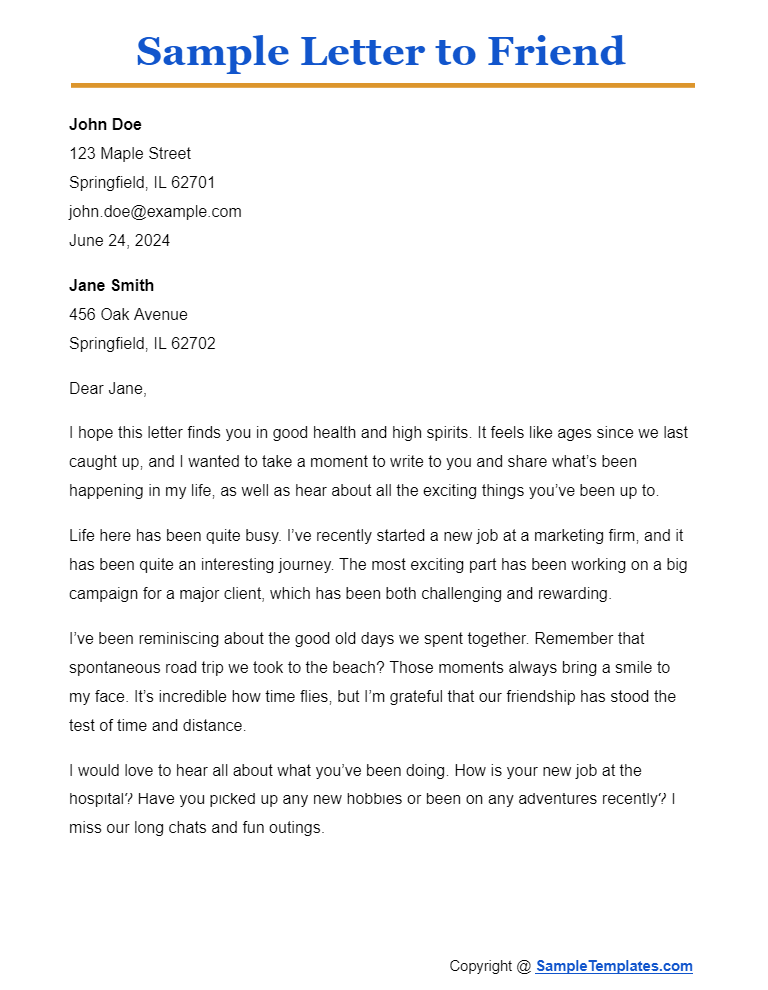
Sample Letter For Students
Emily Johnson
789 Pine Street
Madison, WI 53703
[email protected]
June 24, 2024
Sarah Thompson
321 Birch Road
Madison, WI 53704
Dear Sarah,
I hope this letter finds you well. It feels like ages since we last talked, and I wanted to take a moment to share some updates and hear all about what you’ve been up to.
School has been keeping me quite busy. This semester, I’m taking some challenging courses, like Advanced Biology and Calculus. Despite the workload, I’ve been enjoying my studies. One highlight was our recent biology lab where we got to dissect frogs – it was fascinating to see how everything works inside them!
Outside of classes, I’ve joined the debate club. Our team recently won second place in a regional competition, and I’m learning a lot about public speaking and forming strong arguments. It’s been a great way to meet new people and develop new skills.
I’ve been thinking about the fun times we had during summer break. Remember the time we went to the amusement park and tried all those crazy rides? I miss those carefree days and our endless laughter.
What about you? How are your classes going? Have you joined any new clubs or activities? I’d love to hear about any recent adventures or interesting projects you’re working on.
Let’s catch up soon. Maybe we can plan a study session or a weekend outing. It would be great to see you and chat in person.
Take care and give my best to your family.
Best regards,
Emily
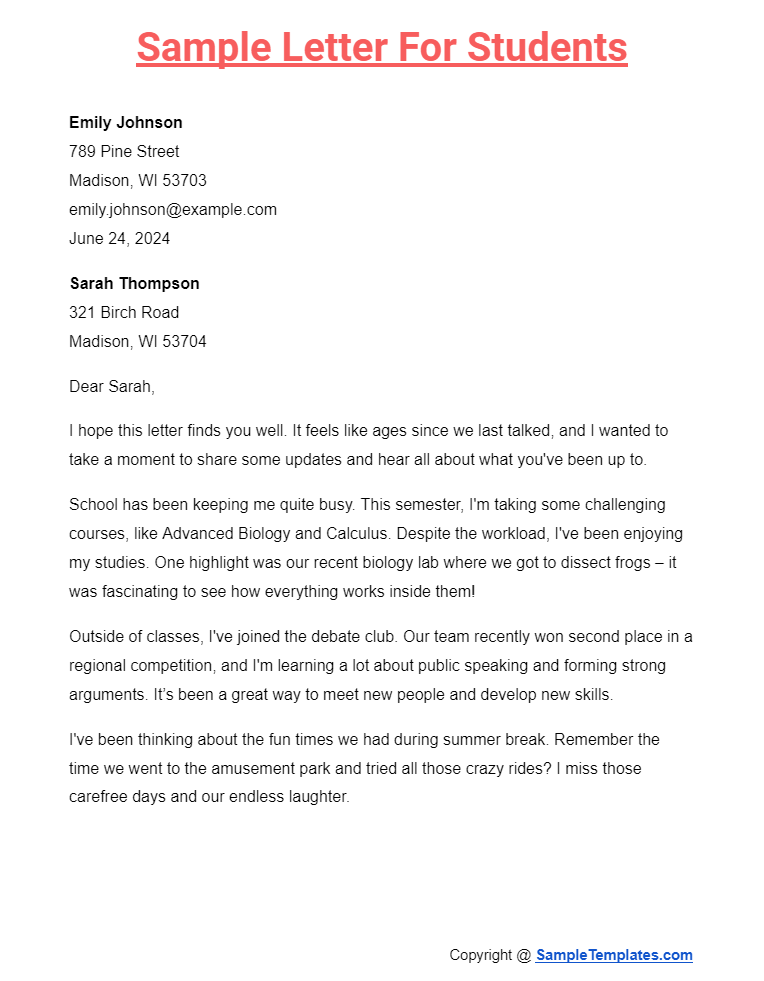
Sample Letter to a Company
Alex Brown
123 Maple Street
Springfield, IL 62701
[email protected]
June 24, 2024
Lisa White
Customer Service Manager
TechGear Inc.
456 Oak Avenue
Springfield, IL 62702
Dear Lisa White,
I hope this letter finds you well. My name is Alex Brown, and I am writing to you regarding a recent purchase I made from your company.
I recently purchased the TechGear Pro Headphones from your website, and I wanted to share my experience with you. The sound quality of the headphones is excellent, and I have been impressed with the comfort of the ear pads. However, I encountered an issue with the Bluetooth connectivity, which occasionally disconnects without any apparent reason. Overall, I am satisfied with the product, but I believe that improving the Bluetooth stability would enhance the user experience significantly.
I would appreciate the opportunity to discuss this further with you. Please let me know a convenient time for us to arrange a call. You can reach me at (555) 123-4567 or via email at [email protected].
Thank you for your time and consideration. I look forward to your response.
Sincerely,
Alex Brown
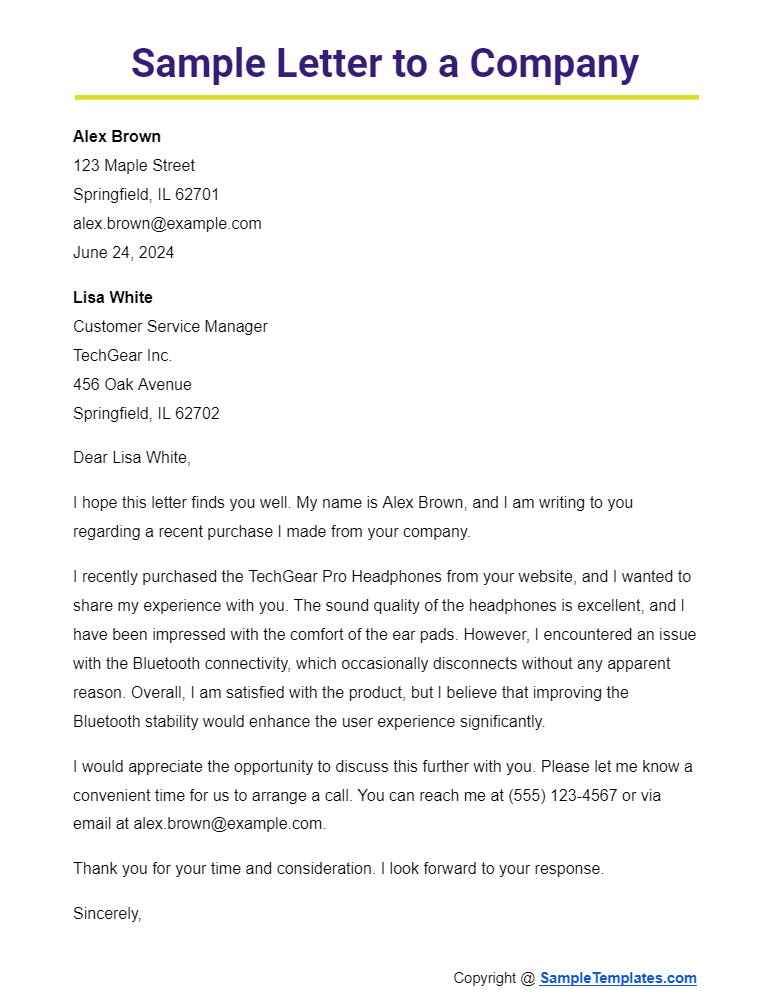
Sample Letter For Job
Jordan Smith
789 Pine Street
Madison, WI 53703
[email protected]
(555) 987-6543
June 24, 2024
Hiring Manager
Innovatech Solutions
123 Elm Street
Madison, WI 53704
Dear Hiring Manager,
I am writing to express my interest in the Software Developer position at Innovatech Solutions, as advertised on your company’s website. With my background in Computer Science and my experience in software development, I am confident in my ability to contribute effectively to your team.
I recently graduated from the University of Wisconsin-Madison with a degree in Computer Science. During my studies, I gained valuable experience in software development, particularly through my internship at TechWave Inc. In this role, I was responsible for developing and optimizing code for web applications, which honed my skills in programming languages such as Java and Python.
At TechWave Inc., I successfully led a project to enhance the functionality of a key application, resulting in a 20% increase in user satisfaction. This experience demonstrates my ability to work effectively in a team and manage complex projects. I am particularly excited about the opportunity at Innovatech Solutions because of your commitment to innovative technology solutions, and I believe my skills in software development and problem-solving would be a great match for your team.
I am eager to bring my background in software development to Innovatech Solutions and am confident that my skills and experiences will enable me to make a positive contribution. I look forward to the opportunity to discuss how my background, skills, and certifications align with the goals of your team.
Thank you for considering my application. I am looking forward to the opportunity to discuss my qualifications further. Please feel free to contact me at (555) 987-6543 or via email at [email protected] to schedule an interview.
Sincerely,
Jordan Smith

Browse More Templates On Sample Letter
Sample Business Letter Format
A business letter format is what you use to write to a business associate, a customer, a client, a business director, etc; or to spread your business more. Hence there are many reasons you would like to use the typical business letter format.
Sample Resignation Letter Format
Resignation letter formats are meant to give you the ideal formal letter types for writing a resignation, while you include all details about the resignation like date of resigning, serving notice period and all in the letter.
Sample Cover Letter Format
This cover letter format is to write a cover letter. Cover letters are meant to be accompanying a resume and hence they are too elaborate your candidature of the job which the resume does not do fully for being extremely factual.
Sample Formal Letter Format
This formal letter format or letter templates are to give you a letter writing a style of formal letters. Thus you may use to read and take suggestions for framing a similar style letter in a formal tone where you include your details instead.
How To Write a Sample Letter?
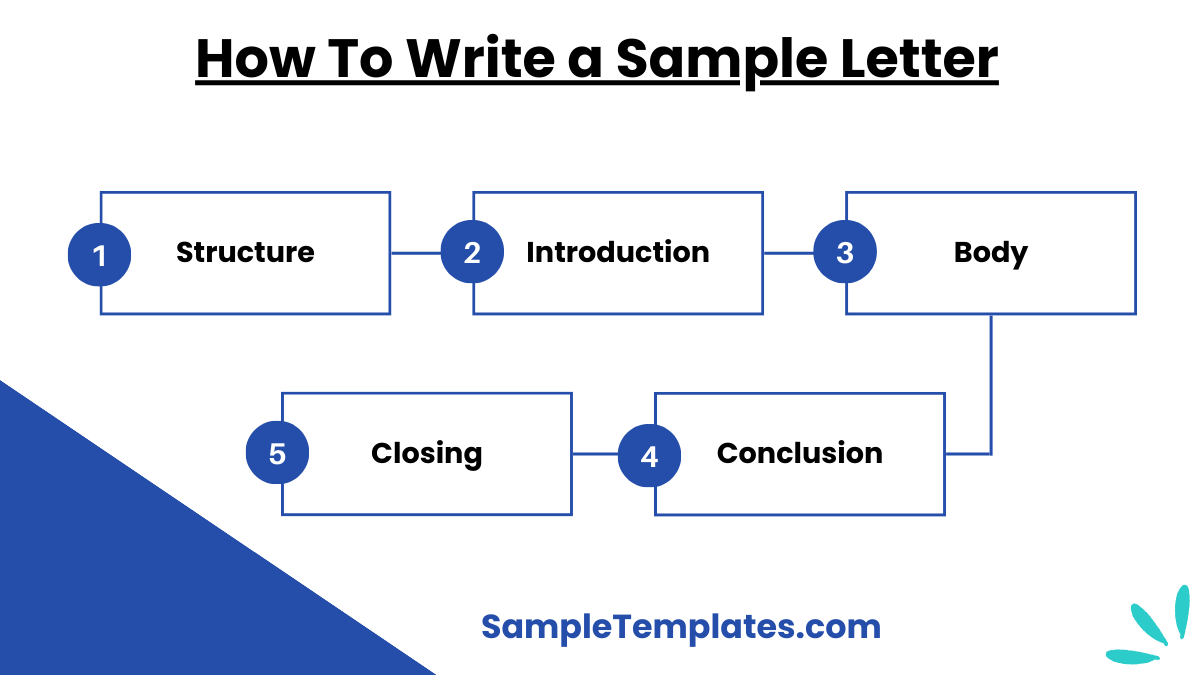
1. Start with the Basic Structure
- Header: Include your name, address, phone number, email address, and the date. Follow this with the recipient’s name, title, company, and address.
- Salutation: Begin with a formal greeting such as “Dear [Recipient’s Name],”
2. Write the Introduction
- Purpose: Clearly state the purpose of the simple letter in the opening paragraph. Mention why you are writing and any relevant context or reference (e.g., a job posting, previous conversation).
- Brief Overview: Provide a brief overview of what will be discussed in the body of the letter.
3. Develop the Body
- Detailed Information: Provide detailed information related to the purpose of your letter. This could include your qualifications and experience (for job applications), specific issues (for complaints), or relevant details (for inquiries or proposals).
- Organized Content: Use clear and concise paragraphs to ensure the letter is easy to read. Each paragraph should focus on a single point or piece of information.
4. Conclude Effectively
- Summary: Summarize the main points discussed in the body of the letter. Reinforce the purpose of the letter and what you hope to achieve.
- Call to Action: Clearly state what you would like the recipient to do next, whether it is scheduling an interview, providing information, or addressing a concern.
5. Close with Professionalism
- Closing Statement: Thank the recipient for their time and consideration. Use a closing statement like “Sincerely,” or “Best regards,”
- Signature: Sign the letter if it is a physical copy. If it is an email, you can type your name. Below your signature, you can also include your contact information again.
Sample Application Letter Format
This application letter format offers the perfect style to write any type of application. This may be official or non-official, a job application or a leave application or anything. But the tone of the letter matters the most.
Sample Informal Letter Format
If you are keen on finding an informal letter format, then this is for you. This format is informal, and yet gives you standard tone to communicate officially. Hence you can use the letter format to construct a letter in an informal or semi-formal tone.
Sample Request Letter Format
To write a request letter the tone must be persuasive and humble. Keeping that as the foremost requirement after keeping the official format in focus, this letter format has been made. Refer to this to get the proper format.
Sample Appointment Letter Format
This appointment letter format is what you use as a standard appointment letter when you are appointing an employee. The status of the appointment, whether full time or part time, and the type of job whether contractual or permanent is expressed in details on this.
Benefits of Using Letter Formats
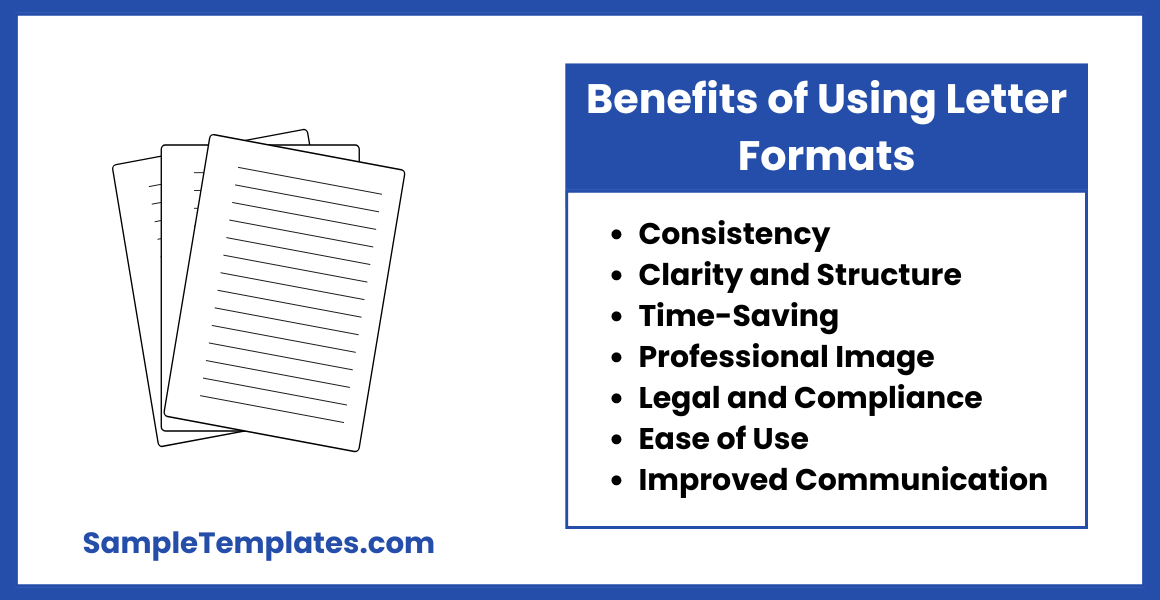
Using letter formats offers several benefits, particularly in terms of communication efficiency and professionalism. Here are some key advantages:
1. Consistency
- Professionalism: Using a standardized format ensures that all sample letters from an organization or individual maintain a consistent level of professionalism.
- Brand Image: For businesses, consistent letter formats reinforce the brand’s identity and reliability.
2. Clarity and Structure
- Readable Layout: A well-organized format helps ensure that the letter outline is easy to read and understand, with clear sections for the introduction, body, and conclusion.
- Focus: Formats guide the writer to include all necessary information and avoid extraneous details.
3. Time-Saving
- Efficiency: Templates reduce the time spent on drafting each letter from scratch. This is particularly useful for routine correspondence.
- Error Reduction: With a predefined structure, there’s less chance of omitting important information or making formatting errors.
4. Professional Image
- First Impressions: A well-formatted letter creates a positive first impression, showcasing attention to detail and a professional attitude.
- Credibility: Consistent, professional communication can enhance the credibility and seriousness of the sender.
5. Legal and Compliance
- Standardization: For businesses, using standardized formats can ensure compliance with legal requirements and company policies.
- Documentation: Well-formatted letters serve as proper records for future reference and legal purposes.
6. Ease of Use
- Guidance: Templates provide a helpful guide for those who may be unsure about how to structure their letters, especially for formal correspondence.
- Flexibility: While providing a structure, formats still allow for customization to suit specific needs and contexts.
7. Improved Communication
- Clear Messaging: Standard formats help convey messages more clearly and effectively, reducing the likelihood of misunderstandings.
- Recipient Convenience: A structured letter format makes it easier for the recipient to quickly find and understand key information.
Sample Relieving Letter Format
The relieving letter format is to relieve an employee or staff from the job role for some time or permanently, and you may use this official format when you are confused as to how exactly you should frame the letter.
Sample Authorization Letter Format
The authorization letter format is used to write the letter of authorization. This authorizes a person on behalf of the writer to do some action while representing the writer. This is one form of official letter format that follows the official tone.
Sample Block Letter Format
The block letter format is a typical letter format, where the whole letter body is aligned to the left, and the paragraphs have just one line spacing in between. This ensures that your letter has symmetry of looks about it.
Sample Complaint Letter Format
This complaint letter format is what you use to typically complain about something, and this standard letter format can be applied to comment for anything at any office or business, school or organization etc.
Sample Dispute Letter Format
This dispute letter format is to write a letter reporting disputes and this letter writing is to address some higher authority with the full reporting of the problem. Dispute reporting is an art.
Tips For Writing a Sample Letter
1. Understand the Purpose
- Clarity: Clearly define the purpose of your letter before you start writing. Whether it’s a job application, a complaint, an inquiry, or a thank-you note, understanding your objective will guide your content and tone.
2. Be Concise and Clear
- Short and Sweet: Keep your letter concise and to the point. Avoid unnecessary details or overly complex sentences.
- Clear Language: Use clear and straightforward language. Avoid jargon or technical terms that the recipient might not understand.
3. Maintain a Professional Tone
- Formal Language: Use formal language and maintain a respectful tone, especially in business or official letters.
- Positive Attitude: Even when writing a complaint, keep your tone constructive and polite.
4. Organize Your Content
- Structured Format: Follow a structured format with an introduction, body, and conclusion.
- Paragraphs: Use paragraphs to break up your content. Each paragraph should focus on a single idea or point.
5. Proofread and Edit
- Check for Errors: Proofread your letter for spelling, grammar, and punctuation errors. Mistakes can undermine your credibility and professionalism.
- Read Aloud: Reading your letter aloud can help you catch awkward phrases and ensure it flows well.
6. Personalize When Possible
- Recipient’s Name: Use the recipient’s name instead of generic salutations like “To whom it may concern.”
- Relevant Details: Include specific details relevant to the recipient or the context, such as a job position, reference number, or shared experiences.
7. Include Contact Information
- Your Details: Make sure to include your contact information at the top of the letter or in the closing, so the recipient knows how to reach you.
- Recipient’s Details: Include the recipient’s name, title, and address to ensure it reaches the right person.
8. Be Courteous and Thankful
- Appreciation: Express gratitude where appropriate, such as thanking the recipient for their time or consideration.
- Polite Closing: End with a polite closing statement, like “Sincerely” or “Best regards,” followed by your signature.
9. Stay Relevant
- Stick to the Point: Focus on the main purpose of your letter layout and avoid digressing into unrelated topics.
- Specific Requests: If you are making a request, be specific about what you need or expect from the recipient.
10. Follow Up
- Next Steps: If appropriate, mention any follow-up actions you sample plan to take or expect from the recipient.
- Contact Info: Reiterate your contact details to make it easy for the recipient to respond or follow up.
Sample Donation Letter Format
This donation letter format is to ask for a donation to some authority, person etc, so that you may get a donation for charity, or for funding a non-profit etc while showing appropriate causes.
Sample Email Letter Format
This email letter format is to give you a strong and standard format that you use to write emails. This can be used to write any official letter, application, request etc through email, and has the specific email writing pattern.
Sample Employment Letter Format
The employment letter is what the employer gives an employee after joining services. This letter describes the job role, the date of appointment, the status of the employee, and more details. You get this exact format here.
Sample Leave Letter Format
The leave letter format you get here is what you use to write an official style leave letter. The leave letters are written tactfully to keep an official format, and a requesting tone so that you may get the leave granted. This soft tone and standard format are shown here in the template.
Sample Love Letter Format
This is a completely unofficial and personal letter style. This can be recreated in many ways, however, for the first timers who are trying to get suggestions from a sample, this format is good to use to propose or tell about the lover’s emotions through words.
Sample Professional Letter Format
This professional letter format is what you use for any sort of professional dealing or word exchange through writing. This format is especially important to give you a ready reference to professional letter writing anytime.
Sample Basic Letter Format
The basic letter writing skills also need to be mastered so that you become one good writer over time. That is why you must try following this format whenever you are confused about writing a letter.
Letter of Agreement Format
The letter of agreement style is the format you use to ask for or propose for an agreement through the letter, and this request or application or proposal for agreement is made with a standard official tone which may be fully formal or semi-formal.
What is a Letter Format?
Letter formats are samples or layouts of letters which you can follow to adhere to the proper style of writing. Now every letter has a style of writing which depends on who is writing it to whom, and then what the formal letter is all about. Some contain a totally formal tone, while some contain a semi-formal tone. Some are the typical corporate style while some are very much business style. There are elaborate and descriptive writing formats, and then again short and precise and to the point formats. Hence as a layman confused about letter writing styles, you will have many choices of templates when you surf through the template resources online. Letter writing format types which you get online have all type of letter writing samples to help you out. Thus you can name a style and get it here.
Who can we use the Letter Formats?
The letter formats are found online for the use of any person who has the slightest confusion regarding the letter writing style in the desired format. If you are not sure about a letter format and need to refer to some samples, then you can instantly get that online, and may download and take suggestions of layouts, formats, and language. Or you may use the same format with some inclusions and deletions as per your needs. Anyone who has a very little letter writing experience, or people who are not much well versed with the language, or people who are not much into writing altogether would love to get the help of these templates. Besides people who are confident in writing letters but are in a hurry to make a noticeable and special format can get suggestions from the templates instantly. Therefore anyone and everyone may use templates either to get an idea or to make a letter more noticeable and perfect in format.
When do you need to use the Letter Formats?
The use of letter formats can be made in any situation when you are confused, or clueless, or are in a hurry, or simply need to make a lasting impression. Any and every reason is good enough to make you refer to a letter writing template. When you are not much into writing, that means writing not being your part of the daily job, you will actually be a bit shaky or out of focus to write a letter. It is then that you would be relieved to get more than a perfect letter format for the cause. Again if you are one of them who are just clueless about writing letters, then you will be the happiest person to get a fully ready Proper Letter Format, which can help you complete the letter with the inclusion of your particulars. This is really a short and quick method that can give you really perfect official and unofficial tone letters in a whiff.
Why do you need the Letter Formats?
The letter formats are needed to make perfect letters for any and every work. You may have to make a corporate letter for a job application or resignation, or leave etc, and you get it done through the corporate style formats. You may have to write a business acquisition letter or plan proposal letter and you may get it done in minutes using another apt format. You may have to write a transfer request letter to the employer in a semi-formal tone, and you will get that too in the Professional Letter formats in template banks. Hence whatever you wish can be met when you have the access to letter writing formats online. That is why letter writing can be such an easy job and a hassle free quick job, which you may complete from anywhere as long as you are connected to the internet and may write on screen or on paper.
How to use the Letter Formats?
Using the letter writing formats just involves downloading of the format to make your own letter. This works in two simple ways. One is that you read the letter sample, and write in the same way with a mix of your choice of words and ideas and style of the format. That is how you go with method one. The next way is a smarter job as you simply replace some of the details and facts in the format using your real details and facts, and that is the way you customize the letter to personalize. Both the methods can work well if you do them well. And once you are done, this can be printed directly. You may also wish to write hand written letters by copying the style from the letter formats online. These formal letter writing formats are made with such universally suitable standards, that you may use it while being in any country or business as long as the style suits your demands.
Writing a letter in any style and for any purpose is no more a headache when you have awesome formats of letter available online for totally free usage. Download the print friendly versions free from internal link anchor text, to use them directly with customization or just take ideas from them to write on your own.
If you have any DMCA issues on this post, please contact us!
Related Posts
Resignation Letter for Medical Samples & Templates
Letter of Intent Samples & Templates
Letter of Intent for a Job Samples & Templates
Lease Proposal Letter Samples & Templates
Letter of Inquiry Samples & Templates
Character Reference Letter Samples & Templates
Claims Letter Samples & Templates
Response Letter Sample & Templates
Follow Up Letter Samples & Templates
Sample Project Proposal Letter Templates
Donation Letter Samples & Templates
Addressing a Formal Letter Samples & Templates
Grievance Letter Samples & Templates
Sample Sponsor Thank You Letter Templates
Sample Letters of Request
